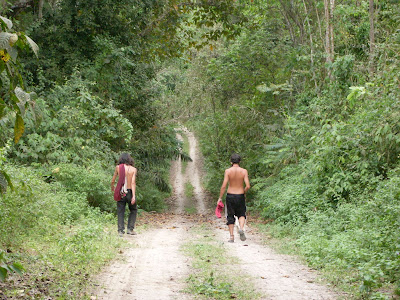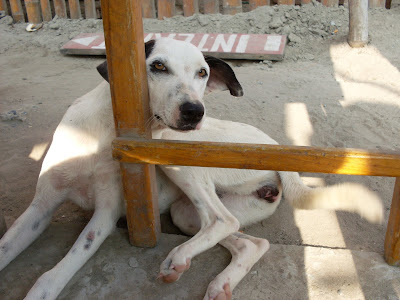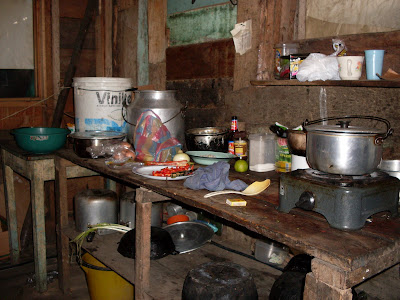
Canoa: Fishermen bringing in their catch.

me: Doing handstands in Mompiche for the sunset and remembering Karyn and her hand stand obsession.
After about a month of being nothing but a beach bum, I am back in the city. A big city. Quito, the capital of Ecuador. At first I was sad to leave the tranquility of the beaches, but arriving last night and driving through the streets of a very European feeling city, was cool. There are so many people here; the cobblestone walking streets, cathedrals and churches all remind me of a mix of Spain and France, in a weird way. There are Christmas trees in windows, with lights and Christmas music. I forgot that it´s December. On the coast it was hot and so tropical feeling I felt like I had never left August.

Canoa at sunset.
But here in Quito, I have taken out my jeans again after a month of not wearing them. Yes, they´re much tighter. Yes, I love the Panaderia´s here. Bread stores. Yummmm. Pan de chocolate, pan de carne, pan de leche, pan de sal, pan de.....oh there so many choices. Sadly, along the coast, the panaderías were limited. Usually one or none in each little village I was in. But maybe that was for the best, as far as my pant size goes.

Ruben.
I met Ruben, a guy from Argentina in Montañita. Actually, I met him first in Baños about a month before. Shay had bought a bracelet from him. He´s an Artisañia. He makes jewelry and sells it on the streets to fund his travels. The jewelry is made from thread or "hilo," similar to what I used to make friendship bracelets with, except it has a durable waxy covering. He finds seeds, shells, trades for stones and crystals and incorporates them into his work. I´ve been learning the trade and have started trying to sell some of my own work. Ruben has been travelling for about nine years now. He lived in Colombia for three years at one time and in Brazil for another three years.

El Gato.
I also met Gerardo, or Gato, in Montañita. He´s from Chile, also an artisañia and has been travelling for about six years now, going back to Chile every so often to visit his family. Ruben and Gato met several months ago in Peru, went separate ways and then met up again in Montañita.

Gato and Ruben walking ahead of me on the long trail to the deserted beach.
Before I met these guys I was planning on going to Colombia. I had a little fear though about travelling up there solo. After hanging out with Ruben, Gato and other artisañian friends in Montañita, I thought I´d be fun to tag along with Ruben and Gato up to Colombia. They´re kind of like big brothers, which is really nice to have, especially now that Shay is gone. It´s also awesome because they don´t speak English. All we speak is Spanish, so my spanish is getting SOO much better.
So after leaving Montañita, a partying gringo-ville, we went to Canoa, another beach town further north of Montañita. Canoa was a little smaller than Montañita. Only one panaderia there, which only occasionaly had bread at random times. There really wasn´t much to do there except walk the beaches, looking for shells and sharks teeth, talk with locals, and swim. We had a kitchen at the hostel we were staying at for $2.50 a night, which was really nice because everyday, the guys would go down to the beach, help the fisherman push their boats back onshore and then come back with hands full of fish, gifts for helping. The family that owned the hostel, let us use their kitchen and then we would pull a table from off the porch and put it in the middle of the dirt road in front of the hostel. There we would feast. We made many good meals in Canoa. One night, after walking all day, without any food or water, getting lost and finally finding the secluded beach we were looking for to hunt for sharks teeth, we made it back to Canoa, bought 3 pounds of chicken, 2 packets of spaghetti, a bag of tomatoes, onions and peppers and cooked a grand meal. Each of us ate about a pound each of chicken and all the spaghetti. I think I ate the most out of the three of us. "Newton John," Gato said, "comes como un hombre."
My name here is no longer Libby. After 2 months of people butchering the name Libby, (Leeebee, Libya, Lydia) I have adopted the name Olivia. It sounds pretty in Spanish and it´s a lot easier for everyone to remember for some reason. Gato calls me Newton John, as in Olivia Newton John.

The three pound chicken spaghetti feast.

Mancha: "Mi" mascota de Canoa.
She and her mom followed us everywhere. There were so many dogs in Canoa. They were always roaming the streets and beaches fighting, playing and begging.

This picture was taken for you, Sean.

La playa escondido: Where we hunted for sharks teeth.

Mompiche: The little village was so small and wonderful. Every night at 7:00, the power would go out for the entire village. You could see every single star and hear everything so much clearer.
After a week in Canoa, we went further north to Mompiche, an even smaller beach village with no panaderia and hardly any gringos, which was awesome but not so awesome for the guys because there was no one to buy their stuff. Our feasts dwindled to sandwhiches of cheese, some weird meat, cucumbers and sardines. We didn´t have a kitchen in Mompiche which also hindered our creative cooking abilities. On Thanksgiving, the fisherman came back to shore with two boats loaded down with the biggest stingrays I´ve ever seen. Two of them were each probably five feet wide. It was sad to see them on the beach, bloody and dead, vultures circling around above them, but we walked away with a huge bag full of stingray. We wandered for awhile looking for a kitchen to cook in. Ruben asked a woman working in her empty restaurant if we could use her kitchen to cook the ray. So my Thanksgiving dinner this year was stingray, one big beer between the three of us and some salt. Stingray is a little weird. Tough, but fishy flavored. Rico! I tried not to think about the pies I imagined my mom cooking back home.

Thanksgiving Dinner.

Two fishing boats came back with sting rays.
We left Mompiche yesterday in the back of Jeep, dust flying everywhere, eyes closed and took a seven hour bus to Quito. We are headed to Otavalo within the next couple of days, where the largest street market in South America is, and then from there, we´re going to the border. My family is nervous. With reason, I suppose. But everyone I´ve spoken to that has been to Colombia, has nothing but good things to say about it. I think going with the guys is good too. We stick out as tourists still, but they have an advantage in dealing with people here because they´re South American. I´m excited for Colombia. Ecuadorian set meal lunches of rice, beans and chicken are getting a little old. I´m ready for some Colombian cuisine.
We´re going to Cali, Colombia where Ruben lived. His brother and his wife and children live there and Ruben still has friends in Cali also. He and Gato are planning on passing Christmas there with friends and family and as for now I think I will too.

Gato and some of the gigantic sting ray.

Canoa.























